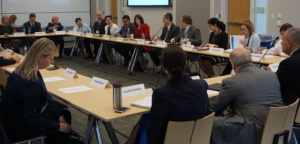 Earlier this month, the National Center for Medical-Legal Partnership teamed with the Office for Access to Justice at the U.S. Department of Justice and the Legal Aid Interagency Roundtable to host a meeting on the ongoing opioid crisis and how medical-legal partnerships can play a role in alleviating its effects. The meeting was attended by representatives from the Department of Health and Human Services (HRSA, SAMHSA and ASPE), the Department of Justice, the Department of Veterans Affairs (VA), the Legal Services Corporation, the Social Security Administration, and several national partner organizations.
Earlier this month, the National Center for Medical-Legal Partnership teamed with the Office for Access to Justice at the U.S. Department of Justice and the Legal Aid Interagency Roundtable to host a meeting on the ongoing opioid crisis and how medical-legal partnerships can play a role in alleviating its effects. The meeting was attended by representatives from the Department of Health and Human Services (HRSA, SAMHSA and ASPE), the Department of Justice, the Department of Veterans Affairs (VA), the Legal Services Corporation, the Social Security Administration, and several national partner organizations.
Legal expertise and services can play a role in helping parents maintain or reclaim custody of their children, expunge criminal records that bar employment, and ensure access to health insurance and benefits – all of which contribute to the stability and stress reduction that are important factors in the road to sobriety. Currently five medical-legal partnerships around the country in Illinois, Indiana, Ohio, and Nevada, have begun projects to specifically provide these supports to people with substance use disorders. Some offer services in primary care settings at health centers, while others are situated directly in drug treatment programs. While each of these programs is a year-old or less, each team when interviewed suggested that legal services could better support goals of sobriety when delivered as part of a clinical response.

Speakers Maha Jweied, Bob Bullock, and Bruce Ohr from the U.S. Department of Justice, Jay Chaudhary from Indiana Legal Services, and Ellen Lawton from NCMLP.
Participants at the roundtable acquired new knowledge of the opioid crisis from Christina Mead from the U.S. Public Health Service at HRSA. Anne Dunn, Deputy Director of the VA spoke about the success of medical-legal partnerships in VA Medical Centers and opportunities to expand their reach for veterans with opioid use disorders. And Jay Chaudhary from Indiana Legal Services described how their MLP is providing legal services in tandem with clinical care for this population. Participants gained a better understanding of areas where legal services could support recovery, and opportunities for legal, health, and public health agencies to collaborate to support patient care. The group discussed potential pathways to support these types of partnerships, and agreed that the next step is to raise awareness of these linkages with colleagues at their various agencies, and to reconvene to explore further opportunities.
